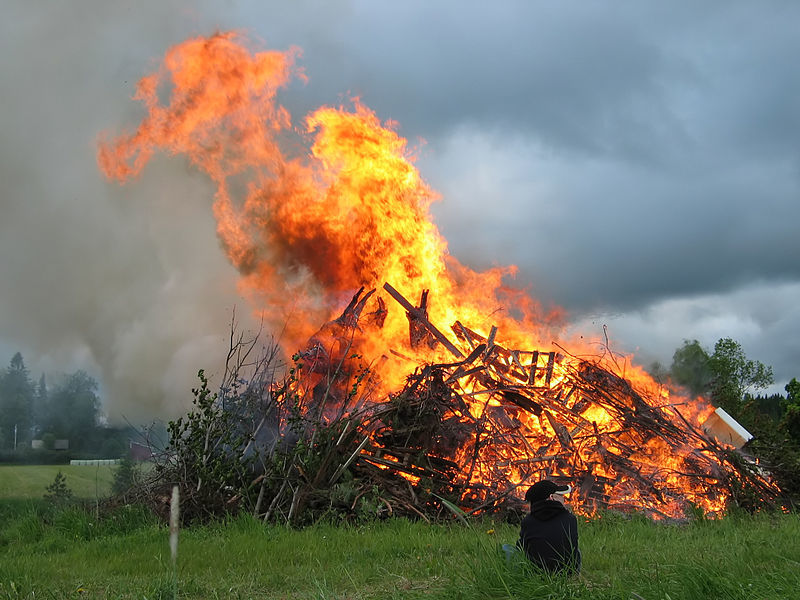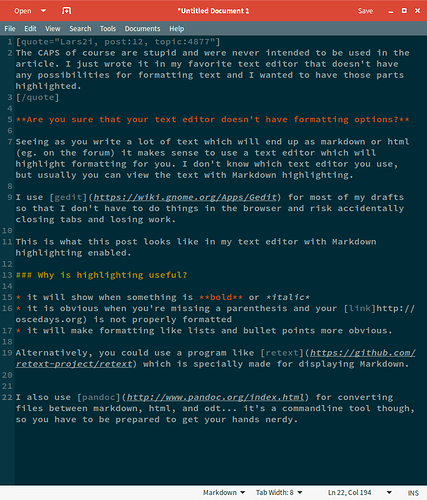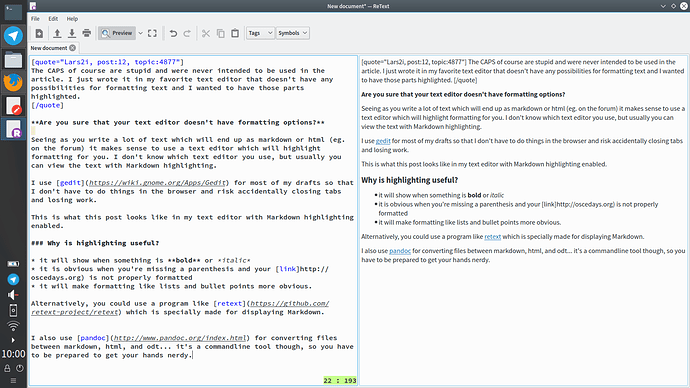META: Hi. I got a rejection from a funder for our project. And I could use the frustration to do something constructive.
Here is a draft for a blogpost I will publish in my blog in the coming days. I think the points made are very important. And they should be discussed much more. The reach of the OSCEdays Blog is probably better than my personal one. So if we think it is good (I have to think about it as well a bit more – I am not sure) – we could place it there.
UPDATE: I will rewrite the post. The points will be the same. But the tone will be as constructive as the critique and suggestion is meant.
Cover Image:
img by USDA Forest Services, CC-BY
Title & Body:
#Dear Funders: Please stop preventing good things from happening (here are some suggestions how)
This post criticises current competition-based funding practices which burn resources through poor process design. And it provides constructive suggestions for better solutions. If you’re involved in a funding organisation, please read the whole post. If you are a project experiencing some of these poor funding practices, feel free to send the funders this text.
_
##Personal Bit
I have been working hard for many years now. And the only constant thing, other then my work progressing (like 1, 2, 3) [LINK] is being rejected by funders. Over the years I have applied for various grants, sponsorships, and fellowshipsa and never got anything (with one honourable exception – thank you Josef Spiegel [LINK KÜNSTLERDORF]).
Of course I wonder what I am doing wrong, and try to analyse how current funding practices work. It is time to share my collected thoughts.
What I do is pushing ‘Open Source for Sustainability or Circular Economy’, and I therefore go after ‘sustainability’ funding. So this piece is about funding for ‘sustainability’ projects - not about startups, or companies, or construction projects for example.
##’Capitalism’ can’t fund ‘Sustainability’
From a very general perspective – a perspective where we use words like ‘capitalism’ and ‘sustainability’ it is fair to say, that capitalism won’t fund sustainability. Capitalism, on a general level is about exploiting and exhausting our planet and human beings. Sustainability is about saving them, and working against exploitation and exhaustion. Sustainability is about consuming less. Capitalism is about consuming more.
So they are opponents. And this means that the capitalist abilities for change making and funding things don’t work for sustainability. Funding for sustainability needs to come from sources and institutions that can operate with a different logic, like foundations or the state.
The urgent need for sustainability grows every year. And in reaction to this, so too does the list of projects and ideas for sustainable change and practices. And therefore, ever more funding is needed, even though potential sources aren’t increasing as fast. So the resources are very scarce - we need to be smart about how we use them. But when you look at the landscape of current funding practices, this is sadly not the case! There is something fundamentally wrong in how decisions are made and how funding is provided in the field of sustainability. It is time to change that.
##Avoid Competition In Your Funding (& Project) Design
This is the major point of this article: A lot of funding practices and projects are designed within the “old paradigm” of competition. But sustainability needs collaboration. We need a shift towards collaboration.
‘Competition is the strongest driver for productivity’ – was a core belief of our societies in the last decades. The rise of neoliberalism was a vehicle of that belief. But the claim was never supported by scientific evidence. And on the contrary – in the last years more and more evidence is found, that it is not! Collaboration is the stronger driver, while competition redundantly burns resources! And prevents things from happening when they are scarce. [LINK https://mitpress.mit.edu/hownot ].
We should get away from these funding and project designs!
When capitalism can’t fund sustainability – why should sustainability be funded with capitalistic logic?
I will give you some examples of bad – competitive – funding or project designs first before I start with some suggestions for better – collaborative – ones.
##Horizon 2020
Horizon 2020 is a funding program for research and innovation by the European Union with a budget of 80 Billion Dollar! [LINK https://en.wikipedia.org/wiki/Framework_Programmes_for_Research_and_Technological_Development#Horizon_2020]
I’ve heard claims that 20% of the Horizon2020 budget is needed to feed the bureaucracy to process the funding. If this is true it would sum up to 16 Billion! I’ve also heard that in most of the Horizon 2020 programs the chance to get the funding you apply for is 5 percent! Only one out of twenty gets it! Wow.
(I haven’t been able to verify these figures - does anyone have data on it? it sure woud be easier to discuss this if their finances were transparent and accessible)
But it is fair to assume that a lot of people who apply, don’t get it.
And I know [LINK PODCAST FOCUS EUROPA], that writing a proposal is a huge pile of work – it is months of work! And the whole process is so complicated, and the competition so hard that there are companies focused entirely on provding consulting to institutions for writing their applications. And your chance to get the grant without this consulting is practically zero!
What a huge waste of resources! That is not covered by – that is externalized from - the 80 Billion! If really 95% of the incredibly difficult to write applications fail …
The time and creative and productive energy of (mostly young) researchers and change makers is wasted here! They are forced to write about what they want to do and are held back from actually doing it. There are some positive effects from making them create these proposals [FOOTNOTE 1], but I think the negative effects outweigh them.
THIS FUNDING PRACTICE PREVENTS GOOD THINGS FROM HAPPENING!
As it burns resources to feed a resource-consuming filter process…
I stopped writing applications a long time ago – these days I hardly ever do it. Because I want to do things and make them happen, and not get stuck talking about ‘what I want to do’ instead, just so that I will contribute to a rich plate of options for funders to cherry pick from. They make me participate in some kind of lottery. Where a lot of the time, the chance is even smaller then 5%! If I had engaged in that game, probably none of my work would exist right now.
Funders prevent good things from happening.
##The Need To Send Out Negative Replies
And along with this funding or project design, there’s the need to send out rejections or negative replies. So many people get them all the time. And they are an ultimate downer.
I was asking a lot of my friends, and everyone tells me, that rejections make them feel down at least for half a day – and incapable of doing real work. Which means: Incapable of pushing sustainability.
Let me tell a short story that happened to me. Someone suggested that we apply with the OSCEdays for an award (that offered a little prize money) [LINK ZEITZEICHEN]. And we got an email saying that we were on the short list of projects. Yay! So it felt a bit safer. Our hopes were bouyed, a lot. And then we got an email with a negative reply. That was a punch to our stomachs. Especially so because the first email even had given us hopes.
I remember starting my morning that day full of energy and in a good mood – ready to take on the long list of tasks infront of me. And then in the morning I read this email. And it made me down, all the energy was gone for work, for the better parts of the day!
So the funder did not only consume my time when making me write the application. They also stole my time afterwards when punching me unnecessary hard with a rejection. The first rule of good collaboration is to respect and protect your collaborators’ time!
But these practices take out time from sustainability projects.
SO FUNDERS PREVENT GOOD THINGS FROM HAPPENING – [FOOTNOTE 2]
Funding designs like that are incredibly stupid.
They might be ok for the world of start ups. Where it is deemed necessary to ‘stop’ bad ideas and people not strong enough to push them through. But in the world of change-making for sustainability we need almost every hour we can get…
I will come to suggestions for positive funding practices in a bit. But I like to add one more story about how bad, energy consuming and counter-productive competitive funding and project designs can be:
##POC 21
POC 21 is a project, not a funding institution. I add it here to show how competitive designs even harm projects.
POC 21 happened in 2015. It was on its surface about “Open Source Hardware for Sustainability” – about exploring, developing and pushing collaborative practices for a sustainable future.
This was the claim. But the whole project was not really designed for it. ‘100 Geeks, 12 Open Hardware projects, 5 Weeks in 1 Castle in France’. That was the setting. And a a problematic premise and design decision.
Because you can’t fit an unlimited number of projects into one castle. So you have to make people apply (or they did). And then you cherry pick. And you can’t have an infinite number of people and supporters either. So you have to cherry pick here as well.
This naturally (and by design) creates a highly competitive atmosphere.
I live in Berlin where we have a relatively small open hardware community. And for weeks, the atmosphere in this community was poisoned by competition, envy and jealousy. “Who will go? Me of course. I will go. You? I don’t know about you. I don’t care for you. I will go. I have to go. Of course! I know the guys… You too. But I don’t know about you…" And so on.
Our small open source hardware community should be about collaboration. About making things possible for each other. Creating synergies. (There are project/event designs that work for example decentralized events like FabJam [LINK]). Synergies and collaboration … Not staring jealously at each others’ plates. The premise of the project lead to a toxic atmosphere by choosing a project design that created scarcity and competition.
And if you start with a bad design decision - a design decision for competition - the whole project might not turn out that well.
POC 21 turned out to be first class escapism – [LINK SAMS DOCU] a self-experience camp for likeminded and privileged people comforting each other to save the world right now, fueled by American Awesomeness [FOOTNOTE 3] and Weltuntergangsporn & pathos (world apocalypse porn and pathos.) [LINK POC TRAILER]
Where people barely spoke about open hardware. But mostly about themselves.
And if you want to fit so many people into an old caste, you need a lot of ad-hoc infrastructure. POC 21 burned a lot of their infrastructure afterwards.
Welcome to the world of sustainability change of today. [4]
img by Janne Karaste, CC-BY-SA 2.0
I added this example here to show that even projects, that claim to be about collaboration and sustainability, externalize their true costs - by harming larger communities to create a smaller community for a short while – and by harming the environment for example by making everyone travel to France and by throwing tons of resources on ad hoc one time infrastructure that needs to be burned afterwards.
–
#Solutions
Ok. Let’s switch to some solutions or suggestions, because that is what we are here for.
The good news is, all the practices I describe exist already, and are in use. I’m just suggesting that more funders should adopt them, and develop them further!
##Reach out to them!
This is the first important bit: Reach out to them – to the sustainability people – don’t make them reach out to you.
The best support experience I ever had was when the Renewable Freedom Foundation [LINK] reached out to us [LINK OSCEdays], to help us – at least to meet in our international team for one time [LINK TO BLOGPOST ABOUT LONDON]. And also when the Künstlerdorf Schöppingen reached out to me for some work [LINK thecityisopensource].
This is good design! It did not ask to first do some work just for them, for free.
##Support them to communicate their project
I understand that in order to make a funding decision, a funder needs to filter and find out, who is behind the project, what is it all about, and is it worth the funding. That is the purpose of applications.
In the world we had 25 years ago – a world without internet, it makes sense to have all the projects reach out to you. Because it was very expensive to gain visibility. And how should a funder know about the projects? So the funder had to invest money to gain visibility for himself – spread the call – and make the projects put in effort to make themselves visible to the funder, by sending in a paper letter.
But the internet has changed that! Everyone can set up a website very quickly and almost without costs. And the technological progress of search engines is amazing! So as a funder: Do some searching online! Find them first. A project that is not capable of creating a basic website is probably not worth funding anyway. But you can help them to set up websites and even support other funders to find and filter projects by themselves. [FOOTNOTE 5|
And what to do once you have found them, and become interested in them?
SUPPORT THEM TO EXPLAIN THEMSELVES – FUND THEIR APPLICATIONS
A funding application serves many purposes. It provides the funder with some necessary information (for example: Is the person or team behind it capable of clear communication or planning).
But writing the application consumes a lot of resources. Complicated applications favour existing and already funded institutions who have the resources to write them. It excludes young and new groups. (Which also makes sense on a certain level [FOOTNOTE 6]
So if you are making pioneers write longer proposals, then fund that! Give them a little bit of seed funding to explain themselves. Don’t consume their limited resources to serve your filtering needs!
I know that these practices exist – for example in Germany in architecture “Kunst am Bau” (art on the building) competitions. People are invited to propose something, and are paid for the work on the proposal.
And if you’re making them write a proposal, get them to write one that actually helps the project - not just you. The proposal should create a useful outcome – something the project can use also for other things – so that, even if you decide not to fund them afterwards, they still took a productive step.
There are several ways to do that. One is: help them to write the proposal. This way you already have a chance to meet them, and through collaboration you can understand what they really need. Listen to them! A “business plan” is a good metaphor. A business plan is not just for investors but also important for the founders – as it makes them ask important questions about their idea, look at it from different angles and understand it much better.
Yes, this will create a lot of work and expense for you. But this just means that you will not externalize the costs of the filter process to the projects. You can help them instead.
SUPPORT THEM, DON’T MAKE THEM SUPPORT YOU.
Look for structures like that! For structures that create synergies.
##Money Can Destroy Projects
The suggestion laid out above is of course in favour of a culture where the projects already exist first before they get further support.
This can come with problems. But it has also good sides. It means, for example that people are commited - applicants who really want to do what they are doing and are not just inventing a project to fit available funding, and when the funding expires, they will leave the project. So maybe it favours more sustainable projects.
But here is one interesting problem that can occur: Pumping money into an already existing and stable project can hurt it or even destroy it!
Because there is already a balanced and working structure. And money changes things – for example the motivation in the project, and power structure and even the goals. And whatever made the project possible so far might vanish … and the project might die.
But we know of this problem. And so we can try to do something about it.
For example start with some research on why is it happening and how to prevent it.
And it could be, or should be, part of the application you make and fund the projects to write – to reflect this problem and come up with good structures or answers how to process money in a team or project. And what happens when it is gone again.
This would be excellent, useful work! And something really valuable for society.
##Closing Remarks
Ok. Enough for today. All of this were just general suggestions:
PLEASE STOP EXPLOITING AND EXHAUSTING PROJECTS AND ACTIVISTS, AND START COLLABORATING WITH THEM!
We need collaboration for sustainability. Not competition or exploitation.
I can imagine that this might not be easy to wrap your head around at first. I am happy to assist you in fleshing out these first ideas into detailed proposals and finding out how to design collaboration, through collaboration. That is what we [LINK OPEN IT AGENCY] specialize in.
Thanks for reading.
###Footnotes
[FOOTNOTE 1 – One effect for research is that writing your idea down is the first step into the research. (And this can also be relevant for sustainability projects). Another not that obvious effect is, that for Horizon 2020 you need to build a consortium of institutions that are spread across Europe. The urge to create this consortium makes people already talk to each other to set up the proposal. A network is created and relationships. And even if the proposal is rejected – the connections are made. And connections are a good thing and of certain value for society and each of the partners. But this is just theoretically. Because I know from experience that this connections are not very strong. And count almost for nothing when the rejection comes in. They don’t translate into other things. And are marked with an unpleasant feel of failure – and humiliation for the party that drove the initiative.]
[FOOTNOTE 2 – The prize money was I think 1700 Euro. And when we assume that 30 projects applied (probably much more) and got a rejection like this – 30 days of work were destroyed. And when we say each day is worth 100 Euro (ridiculously low) – then this sums up to 3000 Euro in damage. So the damage is even higher than the done good! ]
[FOOTNOTE 3 – It is not a “halloween party” It is a “terrifyingly wicked halloween party” - the two extra words will help you believe it. And the word “awesome” is in use, a lot.
[FOOTNOTE 4 – I will share the link to this article on Facebook with the POC 21 community. Although my very smart colleague Sam advised against it - against adding POC 21 at all to the article, and he is probably right. There was a longer discussion bringing more aspects to critique up and leading towards rewriting (improving) the bit here in our forum: [BLOG SUGGESTION] "Dear Funders" – Critique On Current Funding Practices A lot of the POC 21 people I consider to be my friends. And I am sure most of them will think at first, I will mention POC 21 of a positive example. But I don’t see it that way. And I want to make them see it. Because I know, their intentions are good. And they are good people. I am happy about every new critique perspective on my projects - I can smash for example the OSCEdays in a view sentences if I would be asked too. And I am sure the POC 21 people are happy about it too.]
[FOOTNOTE 5 – You could fund the creation of a little guide how to set up a website – that would then serve the purpose of the project and yours as a funder. | And you could fund an open database about projects – making it easier for other funders to find projects to support.]
[FOOTNOTE 6 – When the miracle happened, that a strong and stable institution has emerged, this is something worth to protect.]





